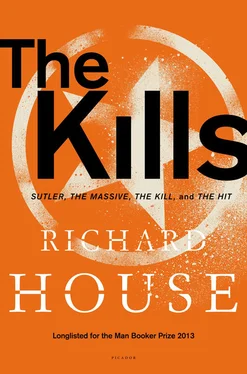They step into the street and a small but noticeable change overcomes Tomas. His discomfort is clear in how he shies away, walks close to the wall, seems in every way keen not to be seen or to take part in the outside world.
Rike’s confession emboldens her and she asks Tomas about his message. ‘It was your voice? February twelfth?’
‘I thought about speaking in Norwegian.’ He looks sideways, a little sly, ‘but I think they want messages that can be understood, no? In the end I also decided not to record a reason.’
Tomas looks ahead, wipes his hand across his mouth. ‘Did the school tell you anything? I spoke with the woman who runs it.’
Rike automatically answers no.
‘I was monitoring security and I caught a team of men stealing from a depot.’ He holds up his arms to describe the assault. ‘The thing is I remember very little. But they came at me with iron bars.’
Shocked, Rike stops walking. She’s sorry, she says. This is none of her business. She’s really sorry.
Tomas dismisses the apology. ‘It’s a fact. Yes? Something that happened.’
‘I’m so sorry.’
‘I was unlucky. I was in the wrong place. I didn’t have to be there. But I saw them, and they came after me. I have no memory of this.’ He holds his hand first over his forehead, slightly to the right. ‘I was hit here, one time, at the front, and also on my chest, my arms. But the damage was worst for my head. This happened in the depot, but I was found at the security post, which is across a large car park. But I have no memory of this, of what happened, or how I got there. After, of course, everything was different.’
Rike can’t think of anything to say except how sorry she is. And isn’t this a lesson about caution, about how she needs to plan to keep them clean and clear of personal revelation — because this is none of her business.
Tomas points across the road. ‘I’m not much in the mood for walking. We should sit perhaps?’
Rike agrees, and follows as Tomas leads her across the road to a café.
* * *
They sit side by side with their coffees and face the street, both uncomfortable with the silence. Occasionally Rike feels an obligation to restart the conversation, but the impetus isn’t there. Tomas looks down at his cup and Rike apologizes and says they can forget about today.
‘I can make it up another time. I didn’t mean to ask about personal things.’
Tomas straightens his back. ‘I was painting the room today, in the basement. Christos came to see me. I asked him about what happened.’
‘Did you find anything?’
‘Nothing. Christos said these people were clever. They rented a room for a month. They had someone prepare it for them. They used it once, only for one weekend. They picked up the first person they met. There was no meaning to it. No intention. Except they wanted to do this horrendous thing.’
Tomas turns the spoon over on his saucer, And without fuss he begins to set the salt, pepper, the sauce pots in order on the table.
The air, stale with coffee from the café and the fruited malt from the wineries and breweries closes over them, and the room yaws open to the street with a long overhanging hood, so that the café might be a cave.
‘They rebuilt my skull. See. On this side.’ His hand traces an area from his temple to the crown.
The conversation falls into shadow, stops, and Rike wants desperately to open this into something new. She changes the subject, tells him about Sutler. Thinking that this subject is a remedy, strange enough to distract him.
‘He’s here. The man from the desert.’
The shift works, and she’s pleased with his reaction. It’s water to a dry plant the way he stirs and listens, becomes present.
‘They flew him to the hospital at Akrotiri, but I don’t think he’s staying there because the burns unit is in Limassol.’ She points left, indicates the hospital no more than two hundred metres away. You know about this? The hospital, she explains, has a burns unit. The British use the hospital for soldiers from Iraq, from Afghanistan, who have — it’s impossible to imagine — wounds you wouldn’t believe. The unit is world-leading for the treatment of burns, and it’s here, in Cyprus, right here, just up the street. So this man has been flown in, wrapped up — Rike combines details picked from Henning and pure invention. It isn’t that she wants to lie, she wants him distracted, she wants Tomas thinking about details, procedures, impossible tit-tats of information. ‘What they do is wrap you in this plastic film to stop the oxygen reaching the burn, it stops the air and bacteria from entering the wounds. They wash you in a saline solution, and they cover you in this wrapper and in these creams, and then lower your body temperature with these silver blankets. They keep you cold so the body slowly recovers, and this is what stops the scarring, the cold, the slow healing, and as with all burns the only problem they have to be particular about is infection, because these super-bacteria are resistant to all forms of antibiotic. Henning has seen this, she says, he’s sat with the man, observed him, and while the facilities look crude, he can assure you they have developed advanced techniques in treating skin and burns and lesions, and they’ve learned all of this through treating soldiers. They sent a group of doctors from here to Damascus to bring him back. They want this man to live.
Information pours from her. The British have insisted on bringing him here because Britain, Germany, the US are squabbling over who should take responsibility for this man. ‘They all believe he is the man from Iraq. Stephen Sutler.’ She isn’t sure if she has mentioned this, but Henning has other attachments to the case. Last summer he met Parson, the man they were calling Sutler Number One. He met the man and advised him, according to Isa the meeting didn’t go well, and Henning advised the man that this was all — as far as he could see — a scam. That no company could be so cavalier or clueless, not with that amount of money. Parson shouldn’t be searching Turkey for Sutler, he should be examining HOSCO, the correspondence, the emails, calls, and contracts. The man is a construction, a front to disguise more serious misbehaviour.
Tomas isn’t to say a word. He must promise not to say one word.
6.2
The police arrive in two vans. They line the street, blue-black uniforms, batons, sky blue helmets and clear shields, then swarm the entrance to the hotel. The whole business is settled in a matter of minutes. One section of the street is closed, and a group of tourists are caught inside the patisserie and instructed to remain inside while the men go swiftly about their business. Their appointed rounds. Gibson watches from the café but once the police are inside little can be seen. At the upper windows he catches the backs of the police, and against expectation there is little shouting. Noise instead, a hammering, comes from a building site, out of view. People are hauled out of the hotel, the woman with the glasses, the man in the singlet among them, and divided, male from female, then taken to one of the waiting vans.
In the café, once the police are gone, the two baristas and the counter clerk eye him suspiciously and say nothing.
6.3
Later in the afternoon the three of them drive from Limassol to Akrotiri. Henning has business on the British base. There are people to speak with, discussions to be held. Advances to be stopped. Yesterday the British brought in lawyers. We bring doctors, he says, the British bring lawyers and PR.
Читать дальше












